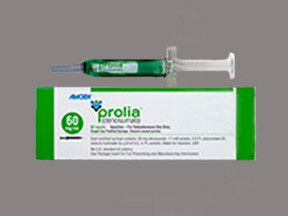DENOSUMAB - INJECTION
PHONETIC PRONUNCIATION: (den-OH-sue-mab)
COMMON BRAND NAME(S): Prolia
GENERIC NAME(S): denosumab
Uses
USES: Denosumab is used to treat bone loss (osteoporosis) in women who are at high risk for bone fracture after menopause. It is also used to treat bone loss in men who are at high risk for bone fracture. Osteoporosis causes bones to become thinner and break more easily. Your chance of developing osteoporosis increases after menopause (in women), as you age, if someone in your family has osteoporosis, or if you take corticosteroid medications (such as prednisone) for long periods. Denosumab is also used to treat bone loss in women who are at high risk for bone fracture while receiving certain treatments for breast cancer. Denosumab is also used to treat bone loss in men who are at high risk of bone fracture while receiving certain treatments for prostate cancer that has not spread to other parts of the body. This medication works by slowing bone loss to help maintain strong bones and reduce the risk of broken bones (fractures). Denosumab belongs to a class of drugs called monoclonal antibodies. It prevents certain cells in the body (osteoclasts) from breaking down bone.
How to use DENOSUMAB - INJECTION
HOW TO USE: Read the Medication Guide provided by your pharmacist before you start using denosumab and before each injection. If you have any questions, ask your doctor or pharmacist. Your healthcare provider will inject this medication under your skin in the upper arm, upper thigh, or abdomen as directed by your doctor, usually every 6 months. Take calcium and vitamin D as directed by your doctor, usually 1000 milligrams of calcium and at least 400 IU of vitamin D daily. Use this medication regularly in order to get the most benefit from it. It is important to keep receiving this medication even if you feel well. Most people with osteoporosis do not have symptoms. Remember to receive it every 6 months. It may help to mark your calendar with a reminder. Continue to take other medications for your condition as directed by your doctor.
Side Effects
Precautions
Interactions
Overdose
Images
Reviews
Faq for DENOSUMAB - INJECTION
Denosumab is used to treat osteoporosis in postmenopausal women, as well as to prevent skeletal-related events in patients with advanced cancer.
Denosumab is a monoclonal antibody that works by inhibiting a protein called RANKL, which is involved in the breakdown of bone. By blocking RANKL, denosumab helps to increase bone density and reduce the risk of fractures.
Denosumab is administered as an injection under the skin (subcutaneous) once every six months for the treatment of osteoporosis. For cancer patients, the recommended dose may vary based on individual circumstances.
Common side effects of denosumab include back pain, muscle pain, joint pain, nausea, diarrhea, and skin rash. In rare cases, it may also increase the risk of serious infections, jawbone problems, and low levels of calcium in the blood.
Denosumab is not recommended for use during pregnancy as its effects on the developing fetus are not well-known. It is also not known whether denosumab passes into breast milk, so breastfeeding mothers should consult their healthcare provider before using it.
It is important to inform your healthcare provider about all the medications you are taking, including over-the-counter drugs and supplements, as they may interact with denosumab. Certain medications, such as glucocorticoids or other bone-building medications, may affect its efficacy or increase the risk of side effects.
The duration of denosumab treatment for osteoporosis depends on individual factors and should be determined by your healthcare provider. It is generally recommended to evaluate the need for continued treatment after five years.
Disclaimer
IMPORTANT: HOW TO USE THIS INFORMATION: This is a summary and does NOT have all possible information about this product. This information does not assure that this product is safe, effective, or appropriate for you. This information is not individual medical advice and does not substitute for the advice of your health care professional. Always ask your health care professional for complete information about this product and your specific health needs.

No Reviews Yet